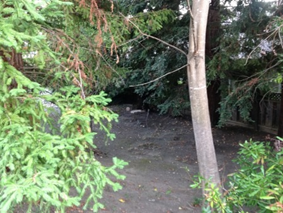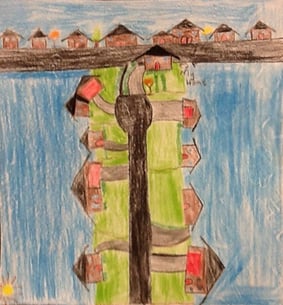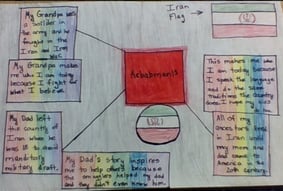 My goal is for my students to have authentic opportunities to reflect deeply and use some of the thinking moves about which I have written in earlier blogs. I’ve worked toward this authenticity in my classroom for years, but I have noticed that an announcement of an upcoming genre study or a new writing assignment for my fifth graders can evoke groans and looks of despair. Not exactly what I had in mind in terms of authenticity! I have been guilty of teaching writing in a formulaic way; I have approached lessons driven by rubrics, structure, and mastering specific writing skills. But deep inside, I know that this style of teaching will lead my students further and further from themselves and authentic reasons to write.
My goal is for my students to have authentic opportunities to reflect deeply and use some of the thinking moves about which I have written in earlier blogs. I’ve worked toward this authenticity in my classroom for years, but I have noticed that an announcement of an upcoming genre study or a new writing assignment for my fifth graders can evoke groans and looks of despair. Not exactly what I had in mind in terms of authenticity! I have been guilty of teaching writing in a formulaic way; I have approached lessons driven by rubrics, structure, and mastering specific writing skills. But deep inside, I know that this style of teaching will lead my students further and further from themselves and authentic reasons to write.
Recently I’ve been asking myself, “How can I create writing curriculum that is accessible to all learners, one in which they are truly motivated to uncover new stories they are driven to share?” I want my students to grow their ideas about different perspectives in the world and discover insight into their own identities.
In a piece called Provide Engaging Tasks for Students to Learn Literacy Skills Authentically, Catherine Snow, the Patricia Albjerg Graham Professor of Education at Harvard Graduate School of Education writes:
Successful literacy learning is not just a practice of aggregating lots of individual component skills. Good literacy instruction offers opportunities for students to acquire those individual component skills, but most of the time, it doesn’t actually concentrate on the skills themselves.
Instead, good literacy instruction is organized around authentic tasks to which the use of reading, writing, and academic language are integral. In the context of engaging tasks that authentically need literacy resources, students can develop and expand their literacy skills without even noticing that they are practicing and mastering them.
Though I know there is a place for some formulaic teaching when preparing for state testing or reviewing details of content, Snow’s research, along with theoretical writing from Donald Graves, Ralph Fletcher, Thomas Newkirk, Katherine Bomer, and others, has inspired me to explore more meaningful ways to nurture students’ passion for writing.
These questions led me to Out of Eden Learn (OOEL), an online learning project that helped me address the frustration I was feeling teaching writing the way I had been. In our OOEL “learning journeys,” students combine off-line activities with online interaction.
Out of Eden Learn invites young people and educators to:
-
Slow down to observe the world carefully and to listen attentively to others.
-
Exchange stories and perspectives with one another.
-
Make connections between their own lives and bigger human stories.
Out of Eden Learn began in 2013 as an experimental collaboration with journalist and National Geographic Fellow Paul Salopek, who is currently engaged in a 21,000-mile “Out of Eden” walk. It has evolved into a promising model for promoting thoughtful cross-cultural inquiry and exchange, drawing inspiration from the ways in which Salopek and other writers and artists weave “slow journalism” and local and global storytelling.
I was intrigued by the article What is Slow Journalism? in which Matt Norman writes, “Questioning the premise that faster is better, slow journalism is about taking the time to report the news with close attention and more depth.” I wanted my students to slow down, look more closely, and write with more depth. Maybe this approach held promise as a supplement to my writing instruction.
Once my students began following the stories of Paul Salopek on his walk and writing for Out of Eden Learn, I found them increasingly engaged in their writing. Paul models the discoveries we can make when we take the time to look closely. As I read the posts in which my students share their stories with students of similar ages around the world in diverse geographical and socioeconomic settings, I was moved by their reflections, honest voices, close attention, and sensitivity. They viewed their own lives in the context of the larger world around them. I see now how the authenticity of the project, the social connections it offered with other students around the world, and the freedom and creativity it invites inspired students to uncover their own voices and thinking in ways I didn’t always see in genre-specific or more formulaic writing. In fact, I saw:
- Desire to look closely and see the world with new eyes
- Willingness to look long enough to expand their perspectives
- Commitment to the quality of their work because the content was deeply personal and they knew their audience would be reading closely
- An eye toward inquiry and an attempt to make sense of the more complex issues of their world
I am delighted to share some writing from three of my students.
For this very quiet student, writing about something as personal and far from the whirlwind of school, just a walk near her home, validated her experience in a way that writing about less intimate topics never had. It wasn’t just that it gave her something meaningful to share with her classmates and those in her “walking party,” it was that she began to see her perspective as meaningful and important in a way she hadn’t before. This gave her, almost literally, voice.
•••
Taking Neighborhood Walks

|
When I walked down the street to a trail in the shape of a loop in my neighborhood I thought there would be nothing interesting. I had already seen everything everywhere and nothing caught my eye. When I walk down the street it is evening about the time of sunset. Before I even get to the trail there is a small table and chairs in the middle of many trees. It is almost hidden. Just the right place to have a peaceful picnic. Blocked by all the sound and houses. Almost like in the middle of a forest. Walking down the street you can barely see it. I have seen this place before but this time it was like I had never seen it before. I sit at a chair and think. Well, I try to. Instead I can't think. I just listen. All of the wonderful sounds. Birds singing, deer sprinting, oh and the busy sound of traffic up the street. I just want to stop hearing that sound of cars. I get up from the table and chairs hoping it would be quiet again but still noise. I wish it was quiet there like it was a few minutes ago. I leave the peaceful place but before I go I take a picture of what I saw when I first came to the table and chairs. I walk down to the trail. I hear birds, deer, and water falling. Water falling? I follow the sound of the water. Walking and walking I finally find the sound where the water was. I find that it was a dam. It was not as full as it used to be since we are in a drought. Still it had never lost its love and comfort. Watching it gives me warmth in my heart. When the sun is almost down I quickly take a photo before the light of the sun is gone. I look at the waterfall much more than I did before. I focus on the things around the waterfall. Then I see a very rare thing in my neighborhood. A deer. The most amazing thing. I watch it far away in the distance drinking water from the dam. We make eye contact and it runs away. I will remember that deer for as long as I can. |
The more it became clear to my students that the goal of OOEL was to invite them to share their authentic selves rather then mastering a writing genre, their stamina increased and they were motivated to find ways to communicate their experiences and ideas as honestly as they could. Knowledge of an audience made them care in a new way and also meant they experienced pride and real joy in what they produced, knowing others would SEE them in their writing.
The details in the following story show a child motivated to share his (nearly universal) experience in learning to ride a bike.
Riding my Bike

|
My map is of my house, and my close neighborhood. The most important place to me, on my map, is my driveway. Many important things have happened in my driveway. I’ve had my first basketball practice, my mom went on a three week long trip, and after the lengthy wait, the first place I got to see her was in that entrance. However, the most important thing that has happened to me on my driveway is when I first rode my bike. I was in first grade, and I had been trying to ride my bike for months before that day. A deal was already on the line that if I was able to ride my bike I would get a toy. Obviously, that would get any first grader to do anything, but not me. Fear had taken over because of how many times I had gotten on the bike, and then immediately fallen over. One of the times I started to bleed from my knee, after that moment I had lost all hope, and become stubborn. Although, I knew I was slowly getting better, I didn't want to show my knowledge. Eventually I was so sick and tired of having failed attempts, that I was determined to just get it over with. It felt like my one thousandth try to my tiny first grader mind, so every time I got on that uncomfortable little seat, I felt agony. My dad was carrying my small orange and red bike, and slowly placed it on the ground. I took a seat, while simultaneously strapping on my helmet. My dad was holding my back wheel as he started the countdown, “3, 2, 1,” He pushed me forward and I zipped off. I was scared, petrified, horrified as a sharp turn came closer to my front wheel. I jerked the handlebars, I shot right, I jerked the handlebars again, I shot left. Finally, I was on the straight away, but as one problem ended, a new problem arose. Previous to this moment, I was going off the push’s momentum, but now I was slowing down and if I didn’t pedal, I was doomed to fall. “Left foot, right foot, left foot, right foot,” I thought. Suddenly I was peddling. “I'm doing it!” I exclaimed. I was very proud of myself, but while I was basking in my own glory I didn’t realize I was rocketing towards my neighbor’s garden. I jammed my fingers into the brakes. As my adrenaline rush cleared, I was thankful that there was no harm done to my neighbor’s front yard, or myself. I looked back at my mom and dad, and I didn’t think I had ever seen them so proud. They both had smiles on their faces, and to this day they still have the video of me riding my bike for the first time. I now love biking, and it is something I do daily, I have it all to thank to this experience. |
The final student shared his family story in a new way. His knowledge of a waiting audience made him care deeply about the quality of the piece.
Connecting Our Own Lives to the Past

|
I am about to tell you about what my Dad had to go through to get from his country (Iran) to America. Can you compare it with how your Dad or Grandpa got to America? My dad left the country when he was 18 to avoid mandatory military draft. He could not leave through the airport therefore he was smuggled out of the country. This is the story of his escape in his own words and his own perspective: “I took a bus from Tehran, the capital of Iran, to the southern border of Iran. It took me 24 hours to get there. After that, I had to stay in a safehouse for a week due to the bad sea conditions. Then one day in the middle of the night the smugglers told me it’s time to go. They took me from the safehouse to a beach. They asked me to swim for half an hour to a fishing boat waiting for me away from shore. We had to wait for another 3-4 hours until the coast guards had passed by. By then, the boat was all soaked, wet, and cold. The boat was 12 feet long. We started our journey! The smugglers told me the journey will take 24 hours. As the sun came up, all I could see was water. As the sun came up, it was getting hotter and hotter, to the point that it was unbearable. When I asked the smugglers for a cup of water, they gave me a bowl with different kinds of species moving in it. As we traveled, we were passing by huge navy ships and cruise ships. I was so scared that they might hit us or tip us over, not knowing it. At one time I was afraid that the smugglers might kill me in the middle of the sea. After we passed the huge ships, the smugglers started to deep sea fish. I was wondering why until we got to the other side of the coast. The smugglers bribed the coast guards. The trade was me for a 9 foot fresh fish.” He had no money or anything in America. He started a job as tutor at The Ohio State University. He built up from there and became what he is today, a periodontist. This story inspires me to help others because the smugglers helped my Dad, and risked their lives, while not even knowing him. Also, my dad risked his life so that he could have a better life and education. He believes strongly in education. Maybe I am passionate as he is in education. I also feel blessed to live in such a nice community and home because some might not have what we have in America. |
Our students live in a fast world. I have noticed that when they are invited to slow down, look closely, and make their own observations, they experience joy in the process. And when they know their stories matter to others, they care about writing them. Understanding others’ perspectives comes more easily for students as Paul Salopek shares his discoveries through slow journalism dispatches, videos, Tweets, and Instagram posts. They feel his desire to understand the world. And in their online dialogues, with their peers in other classrooms around the world, I see a developing eye toward understanding others’ perspectives and the authenticity I seek for them as writers. No more groans and looks of despair!
 Hollis Scott, of Danville, California, has been teaching for 13 years, and currently teaches 5th Grade at Montair Elementary. Hollis’ pedagogy is steeped in an emphasis on interdisciplinary learning, global citizenship, and visible thinking. “There is a social and ethical component to being a good teacher. Students need to learn how to be good individuals, citizens, and workers. They need to reflect and engage thoughtfully in conversations about social issues and how to take action, even if it is with simple acts of kindness.” Follow her on Twitter @HollisWScott
Hollis Scott, of Danville, California, has been teaching for 13 years, and currently teaches 5th Grade at Montair Elementary. Hollis’ pedagogy is steeped in an emphasis on interdisciplinary learning, global citizenship, and visible thinking. “There is a social and ethical component to being a good teacher. Students need to learn how to be good individuals, citizens, and workers. They need to reflect and engage thoughtfully in conversations about social issues and how to take action, even if it is with simple acts of kindness.” Follow her on Twitter @HollisWScott


